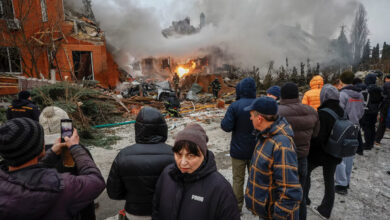
A dangerously intense heatwave across much of Europe is to spike even higher Thursday after already breaking records in several countries, impacting rail traffic and sending people in search of shade and water.
Paris was expected to see the mercury soar to as much as 41 or 42 degrees Celsius, breaking a 70-year-plus record of 40.4C (104.7 Fahrenheit) and turning the UNESCO-listed capital into a baking urban bowl.
Britain’s Met Office predicted a chance that the UK record of 38.5C, which was recorded in Faversham, Kent, in August 2004, would also be exceeded on Thursday.
On Wednesday, Belgium, Germany and the Netherlands all recorded their all-time highest temperatures.
Thursday was forecast to be the peak of Europe’s latest heatwave — the second in less than a month and impetus for new focus to be given to climate change. Cooler weather with rain was expected to provide relief from Friday.
The body-sapping, leaden, shrivelling heat was posing difficulties for humans, animals and crops across the continent.
The northern third of France, including Paris, was under a red alert while the rest of the country had a yellow warning and water-use restrictions were in force.
Cyclists in the Tour de France in southern France had to puff their way over the course in well over 30C.
 ANP/AFP / Phil Nijhuis Temperatures have hit an all-time high in the Netherlands
ANP/AFP / Phil Nijhuis Temperatures have hit an all-time high in the Netherlands In the Netherlands, farmers have been leaving their cows outside to sleep, rather than bringing them in at night, while Dutch media said hundreds of pigs died when a ventilator failed at Middelharnis.
On Wednesday, the southern Dutch town of Gilze-Rijen experienced 38.8C heat, surpassing a record dating back 75 years.
Belgium registered an all-time high of 39.9C at the Kleine-Brogel military base, beating a record that dated back to June 1947.
And Germany’s western town of Geilenkirche sweltered through 40.5C.
Rail woes
Trains in Britain and France were slowed in response to the extreme weather.
French rail operator SNCF advised travellers in the worst affected areas to delay journeys planned at the peak of the heatwave Thursday.
 AFP / GLYN KIRK Britons made the most of the balmy temperatures in the south coast resort of Brighton
AFP / GLYN KIRK Britons made the most of the balmy temperatures in the south coast resort of BrightonThalys and Eurostar train services between Brussels, Paris and London were on Wednesday disrupted by a failure on an overhead power line, although it was not immediately clear if this was due to the heatwave.
A Eurostar train bound for London tore down part of the cable support just outside Brussels. The 600 passengers were eventually taken back to Brussels, the Belga news agency said.
Across the area affected by the unusually high heat, people tried to cool off in lakes and rivers.
In London, police were searching for three people who went missing in the River Thames after going swimming while three people have drowned in Germany since Tuesday.
‘Take care of others’
France’s weather office said the scorching conditions “require particular care, notably for vulnerable or exposed people” with almost the entire country under an orange-level weather alert, the second-highest level.
Paris, in particular, remains haunted by the early summer of 2003 when 15,000 deaths were blamed on the heat and the authorities were bitterly criticised for not mobilising fast enough.

“We need to take care of ourselves but above all others especially those who are alone, and be able to detect the first symptoms of heatstroke,” said Prime Minister Edouard Philippe.
Local authorities have placed restrictions on water usage in many areas due to drought-like conditions that have seen ground and river water levels fall dramatically.
Climate change
This summer’s second heatwave has amplified concerns in Europe that human activity is heating the planet at a dangerous rate.
 dpa/AFP / Jens Kalaene Baby elephant Ben Long takes a cooling dip at the zoo in Leipzig in eastern Germany
dpa/AFP / Jens Kalaene Baby elephant Ben Long takes a cooling dip at the zoo in Leipzig in eastern GermanyThe June 26-28 blast of heat in France was four degrees Celsius (7.2 degrees Fahrenheit) hotter than an equally rare June heatwave would have been in 1900, the World Weather Attribution (WWA) team said this month.
One study by the Swiss Federal Institute of Technology said the deadly, weeks-long heatwave across northern Europe in 2018 would have been statistically impossible without climate change.
burs/rmb/har




